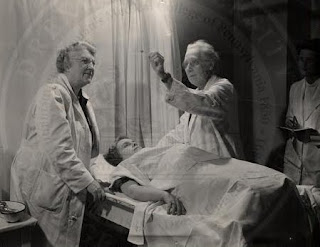The group of volunteer examinees included 1,319 white women between thirty and eighty years old who were seemingly healthy. While all of these women participated in the experimental clinic for five years, 537 of them continued to volunteer for an extra ten years until the experiment ended in 1953.
Cancer Detection Clinic
Procedures
Macfarlane’s associates in the cancer detection clinic she established in 1938 included the pathologists Dr. Helen Ingleby and Dr. Mollie Gelas from WMCP as well as Dr. Margaret C. Sturgis and Dr. Faith S. Fetterman. Macfarlane and her associates provided two pelvic examinations to each volunteer every year over the span of fifteen years. They searched for early signs of cervical cancer as well as other unhealthy conditions that might lead to cancer. Over the course of the experiment from 1938 to 1953, Macfarlane and her associates performed over 18,000 pelvic examinations on the group of volunteers.

Macfarlane in 1953 performing a pelvic examination in her cancer detection clinic. (Drs. Catharine Macfarlane and Margaret Sturgis in the Cancer Prevention Clinic, A Movable Archives)
Volunteers
Poor women, especially black women, were disproportionately affected by cervical cancer due to frequent pregnancies, inadequate medical care, and poor hygiene. This caused Macfarlane to originally plan to open her cancer detection clinic to women living in poor areas of Philadelphia, although her associates and the WMCP disapproved of this plan because they thought that a free administering of examinations would reduce the amount of patients who paid for their private medical services. Therefore, the WMCP required that the volunteer examinees for the cancer detection clinic had recommendations from their physicians, prohibiting poor women from being volunteers because they could not afford a private physician.
"Most of the volunteers appreciated the importance of the undertaking as a contribution to medical science as well as of value to themselves. With others it was a matter of passing interest. When told once or twice that they were in good condition, they grew weary of well-doing and dropped from the ranks."
~ Catharine Macfarlane, “CONTROL OF CANCER OF THE UTERUS: Report of a Ten Year Experiment” (1948)